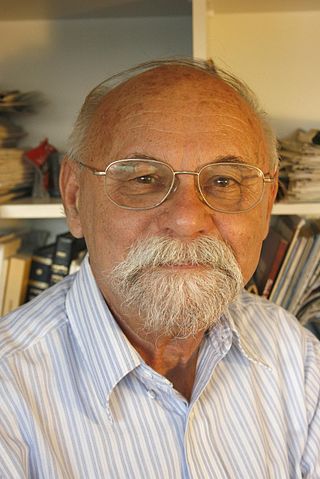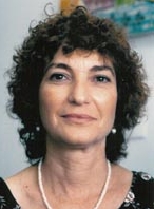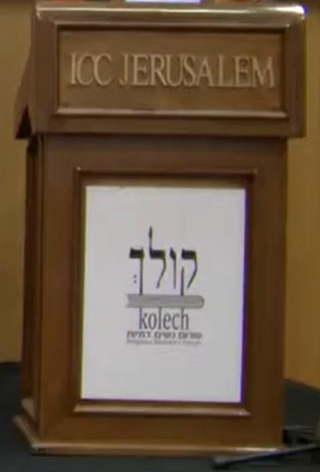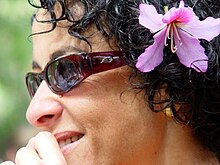
Orthodox Judaism is the collective term for the traditionalist branches of contemporary Judaism. Theologically, it is chiefly defined by regarding the Torah, both Written and Oral, as revealed by God to Moses on Mount Sinai and faithfully transmitted ever since.

Haredi Judaism consists of groups within Orthodox Judaism that are characterized by their strict adherence to halakha and traditions, in opposition to modern values and practices. Its members are usually referred to as ultra-Orthodox in English; however, the term "ultra-Orthodox" is considered pejorative by many of its adherents, who prefer terms like strictly Orthodox or Haredi. Haredi Jews regard themselves as the most religiously authentic group of Jews, although other movements of Judaism disagree.
Jewish religious movements, sometimes called "denominations", include different groups within Judaism which have developed among Jews from ancient times. Today, the most prominent divisions are between traditionalist Orthodox movements and modernist movements such as Conservative, Reform Judaism, and smaller others.
Religion in Israel is manifested primarily in Judaism, the ethnic religion of the Jewish people. The State of Israel declares itself as a "Jewish and democratic state" and is the only country in the world with a Jewish-majority population. Other faiths in the country include Islam, Christianity and the religion of the Druze people. Religion plays a central role in national and civil life, and almost all Israeli citizens are automatically registered as members of the state's 14 official religious communities, which exercise control over several matters of personal status, especially marriage. These recognized communities are Orthodox Judaism, Islam, the Druze faith, the Roman, Armenian Catholic, Maronite, Greek Catholic, Syriac Catholic, Chaldean, Greek Orthodox, Syriac Orthodox, Armenian Apostolic and Anglican churches, and the Baháʼí Faith.
Jewish feminism is a movement that seeks to make the religious, legal, and social status of Jewish women equal to that of Jewish men in Judaism. Feminist movements, with varying approaches and successes, have opened up within all major branches of the Jewish religion.
Tamar Ross is a professor of Jewish philosophy at Bar-Ilan University and a specialist of religious feminist philosophy.

Women of the Wall is a multi-denominational Jewish feminist organization based in Israel whose goal is to secure the rights of women to pray at the Western Wall, also called the Kotel, in a fashion that includes singing, reading aloud from the Torah and wearing religious garments. Pew Research Center has identified Israel as one of the countries that place "high" restrictions on religion, and there have been limits placed on non-Orthodox streams of Judaism. One of those restrictions is that the Rabbi of the Western Wall has enforced gender segregation and limitations on religious garb worn by women. When the "Women of the Wall" hold monthly prayer services for women on Rosh Hodesh, they observe gender segregation so that Orthodox members may fully participate. But their use of religious garb, singing and reading from a Torah have upset many members of the Orthodox Jewish community, sparking protests and arrests. In May 2013 a judge ruled that a 2003 Israeli Supreme Court ruling prohibiting women from carrying a Torah or wearing prayer shawls had been misinterpreted and that Women of the Wall prayer gatherings at the wall should not be deemed illegal.

Menachem Friedman was an Israeli Emeritus Professor of sociology at Bar Ilan University, Ramat-Gan. His expertise was religion and the confrontations between religious and secular Judaism in modern history. He also studied the modern process of Halachic decision making. Friedman was considered one of the leading researchers of Haredi Judaism.

The baal teshuva movement is a description of the return of secular Jews to religious Judaism. The term baal teshuva is from the Talmud, literally meaning "master of repentance". The term is used to refer to a worldwide phenomenon among the Jewish people.

Hanna Herzog is a professor of sociology at the Department of Sociology and Anthropology at Tel Aviv University and a senior research fellow and the academic director of the Civil Society forums at Van Leer Jerusalem Institute in Jerusalem.
Gender and Jewish Studies is an emerging subfield at the intersection of gender studies, queer studies, and Jewish studies. Gender studies centers on interdisciplinary research on the phenomenon of gender. It focuses on cultural representations of gender and people's lived experience. Similarly, queer studies focuses on the cultural representations and lived experiences of queer identities to critique hetero-normative values of sex and sexuality. Jewish studies is a field that looks at Jews and Judaism, through such disciplines as history, anthropology, literary studies, linguistics, and sociology. As such, scholars of gender and Jewish studies are considering gender as the basis for understanding historical and contemporary Jewish societies. This field recognizes that much of recorded Jewish history and academic writing is told from the perspective of “the male Jew” and fails to accurately represent the diverse experiences of Jews with non-dominant gender identities.
Haim Watzman, is an American-born, Jerusalem-based writer, journalist, and translator.
Hiloni, plural hilonim, is a social category in Israel, designating the least religious segment among the Jewish public. The other three subgroups on the scale of Jewish-Israeli religiosity are the masortim, "traditional"; datiim, "religious"; and haredim, "ultra-religious" ("ultra-Orthodox"). In the 2018 Israel Central Bureau of Statistics' survey, 43.2% of Jews identified as hiloni.

Smadar Lavie is a Mizrahi U.S.-Israeli anthropologist, author, and activist. She specializes in the anthropology of Egypt, Israel and Palestine, emphasizing issues of race, gender and religion. Lavie is a professor emerita of anthropology at the University of California, Davis, and a visiting scholar at the Department of Ethnic Studies, University of California, Berkeley. Lavie received her doctorate in anthropology from the University of California at Berkeley (1989) and spent nine years as assistant and associate professor of anthropology at the University of California, Davis. She authored The Poetics of Military Occupation, receiving the 1990 Honorable Mention of the Victor Turner Award for Ethnographic Writing, and Wrapped in the Flag of Israel: Mizrahi Single Mothers and Bureaucratic Torture receiving the 2015 Honorable Mention of the Association of Middle East Women's Studies Book Award Competition. Wrapped in the Flag of Israel's first edition was also one of the four finalists in the 2015 Clifford Geertz Book Award Competition of the Society for the Anthropology of Religion. She also co-edited Creativity/Anthropology and Displacement, Diaspora, and Geographies of Identity. Lavie won the American Studies Association's 2009 Gloria Anzaldúa Prize for her article, “Staying Put: Crossing the Palestine-Israel Border with Gloria Anzaldúa,” published in Anthropology and Humanism (2011). In 2013, Smadar Lavie won the “Heart at East” Honor Plaque for lifetime service to Mizraḥi communities in Israel-Palestine.
Shalva Weil is a Senior Researcher at The Seymour Fox School of Education at the Hebrew University of Jerusalem, Israel. In 2017, she was GIAN Distinguished Professor at Jawaharlal Nehru University, in New Delhi. She has researched Indian Jews, Ethiopian Jews, and the Ten Lost Tribes and specializes in femicide, qualitative methods, violence, ethnicity, education, religion, and migration.

Dov Elbaum is an Israeli writer, editor, journalist, television host and Jewish philosophy lecturer.

Elana Maryles Sztokman is an American sociologist, writer, and Jewish feminist activist. Her first two books, which explore the topic of gender identity in the Orthodox Jewish community, were awarded the National Jewish Book Award. She ran unsuccessfully for the Knesset in the 2020 Israeli legislative election as a founding member of the Kol Hanashim Women's Party.
Feminism in Israel is a complex issue in contemporary Israeli society due to the varied demographic makeup of the country and the country's particular balance of religion and state issues. For secular Israeli women, the successive campaigns for women's rights and equality reflect a similar timeline and progression as Western democracies. For Israeli Arabs, however, the issue of feminism is strongly linked to Palestinian causes. And for Orthodox Jews, selected women's rights and women's representation in the Israeli Parliament are recently debated issues.
Sarab Abu-Rabia-Queder is an Israeli-Arab sociologist, anthropologist, and feminist activist with a specialty in gender studies. She is the first Bedouin woman in Israel to receive a doctorate, and to be promoted to Associate Professor. In June 2021, she was appointed Vice-President for Diversity and Inclusion at Ben-Gurion University of the Negev

Kolech, also known as Kolech: Religious Women's Forum, is an Israeli women's organization associated with Orthodox Judaism. The group's stance is aligned with Orthodox Jewish feminism and religious Zionism.










